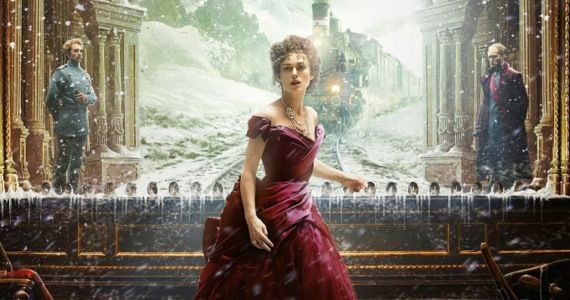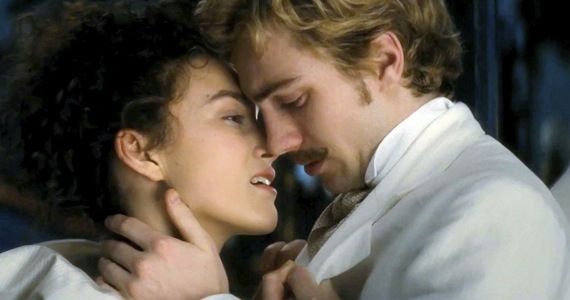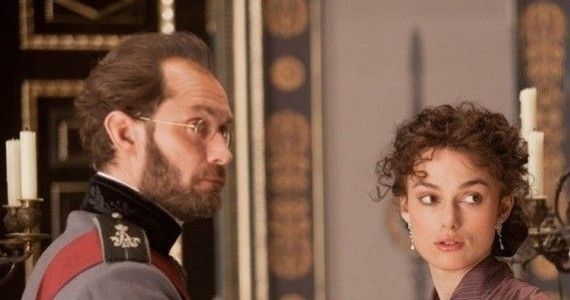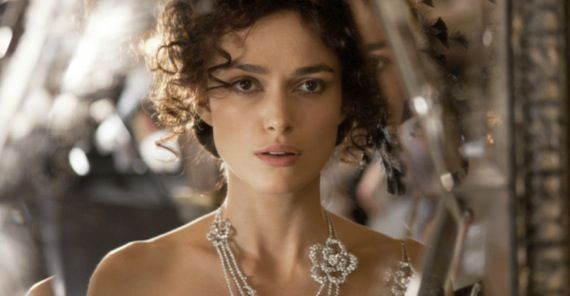The rich performances, succinct screenwriting, and strong direction make it a re-interpretation worth seeing.
Leo Tolstoy's 19th-century novel Anna Karenina is considered a masterpiece of literary realism and one of the greatest tomes ever written (in certain circles, of course). The story was brought to cinematic life numerous times over the course of the last century, in both the Russian and English language. Moreover, its most recent cinematic interpretation comes from the duo of Oscar-winning screenwriter Tom Stoppard (Shakespeare in Love) and director Joe Wright, who is working for a third time with actress Keira Knightley (after their adaptations of Pride & Prejudice and Atonement).
Wright makes the bold creative choice to frame Tolsoy's tale as a stage play; one where the 19th-century Russian high-society is recreated through extravagant sets - and stage hands in the rafters represent the Russia proletariat or working class population - which are juxtaposed with scenes shot on location around the Russian countryside. It's an audacious approach to highlighting an important theme that is explored through Tolstoy's original work; that is, comparing the (literal) artificiality of city life with a more down-to earth and organic existence in that time period. But does that stylistic choice either enhance or detract from the human story and drama unfolding onscreen?
Stoppard's script strips Tolstoy's massive source material of its political discourse (which, as indicated above, is expressed visually, rather than through dialogue), but does retain the two central, occassionally-intertwining, narrative threads. The more prominent thread tells the tale of Anna Karenina (Knightley), a young mother and wife to aristocrat Karenin (Jude Law) who engages in a heated affair with the more age-appopriate bachelor, Vronsky (Aaron Johnson).
Meanwhile, another storyline revolves around Levin (Domhnall Gleeson), a humble aristocratic landowner who prefers to live and work on his own estate - but seeks help from his old friend - and Anna's brother - the boisterous Oblonsky (Matthew Macfadyen), in the hopes of winning the hand of Kitty (Alicia Vikander), who is the younger sibling of Oblonsky's wife Dolly (Kelly Macdonald). However, upon Levin's arrival, Kitty is actively being courted by Vronsky; that is, until Anna enters the picture while on a mission to convince Dolly to forgive Oblonsky's most recent extra-marital fling.
Wright's unconventional approach to Anna Karenina threatens to overwhelm its human and narrative elements, but (for the most part) manages not to, thanks to diligent performances from its ensemble cast. The standouts include Macfadyen, Law, Macdonald, and Ruth Wilson (Luther) as Anna's beguiling friend, the Princess Betsy Tverskoy. Moreover, Knightley invites both our sympathy and frustration as Anna, while Johnson suffices as the shallow Vronsky. Both manage to do solid work together, even though they are portraying a couple who, by design, lack any sort of measurable chemistry (in keeping with the idea that their relationship is based on physical lust, not a need for deeper emotional and/or spiritual connection).
However, not all of the characters and story material presented here successfully avoid being overshadowed by Wright's technical showmanship. The pacing starts to drag and proceedings begin to feel over-long throughout a large portion of the third act, once Anna is forced to deal with the repercussions that come with her actions; her resulting psychological turmoil does not translate as well from Tolstoy's printed page as the events proceeding it. Similarly, the Levin storyline has its moments (such as a tender exchange where he and Kitty quietly play a game full of double-meanings), but its deeper significance and emotional resonance isn't realized as well as the battle between carnal desire and soulful fulfillment in Anna's storyline.
There's a grand momentum and vitality to the first act of Wright's Anna Karenina that's achieved through the combination of balletic cinematography from Seamus McGarvey and impeccable action choreography. This allows members of the cast to move with dancer-like grace around (and sometimes even through) gorgeous background scenery envisioned by production designer Sarah Greenwood - even while dressed in exquisite costumes that are the handiwork of Jacqueline Durran (who, like the aforementioned artists, is a frequent Wright collaborator). The film-as-theater approach teeters on the edge of becoming a gimmick at times, but never falls completely over that line.
As a result of all that, Anna Karenina manages to avoid certain potholes that other period dramas and literary adaptations have fallen into when they strive for more pronounced realism. Here, quibbles about the lack of authentic accents, casting, or historically-accurate details can be dismissed since it's no secret that these events are being staged (literally). However, this calls attention to how, in this retelling of Tolstoy's story, style is essentially equated with substance - rather than meant to enhance the themes inherent to the narrative. Thus, Wright's film captivates as a re-imagining of a familiar tale, but not necessarily one that also sheds new light or offers more insight on the issues inherent to the story (when compared to past re-tellings, that is).
Although Wright's rendition of Anna Karenina is indeed flawed - due in part to the grandiose style, which often (and, not to keep using the pun but, quite literally) hogs the center stage - the rich performances, succinct screenwriting, and strong direction make it a re-interpretation worth seeing. Be warned, though, it won't be everyone's cup of tea, no matter if you are an avid fan of Tolstoy's original novel and/or a moviegoer who just loves prestigious literary adaptations. Moreover, even though the film runs some 130 minutes long, it may not fly by as easily as other titles of an identical length.
Nonetheless, you can rest assured: upon leaving the theater, you won't have any problem remembering that you've seen Joe Wright's Anna Karenina (as opposed to some more disposable and less audacious awards-baiting, arthouse release). It's easily worth a recommendation, on that ground alone.
Here is the trailer for Anna Karenina:
-
Anna Karenina is now playing in limited theatrical release in the U.S., but will expand to more theaters over the upcoming weeks. It is Rated R for some sexuality and violence.




